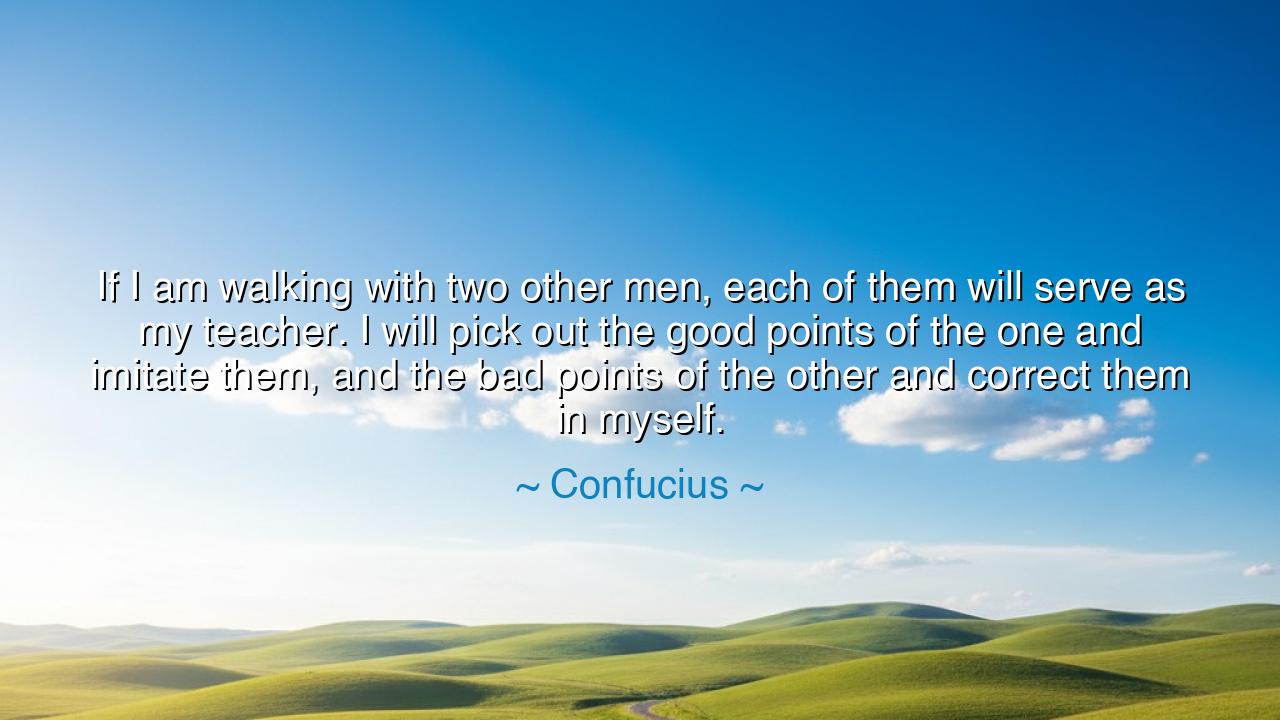
If I am walking with two other men, each of them will serve as my
If I am walking with two other men, each of them will serve as my teacher. I will pick out the good points of the one and imitate them, and the bad points of the other and correct them in myself.






Listen to the ancient wisdom of Confucius, whose teachings continue to resonate with those seeking to live a life of virtue and wisdom: "If I am walking with two other men, each of them will serve as my teacher. I will pick out the good points of the one and imitate them, and the bad points of the other and correct them in myself." In these words, Confucius reveals a profound truth about the nature of learning and self-improvement. He teaches us that in every encounter, in every interaction, there is something to be gained—whether through the virtue of another or through the recognition of flaws that we must avoid. Every person we meet, regardless of their position or status, can serve as a teacher, showing us both the paths to follow and the pitfalls to avoid.
The ancients often emphasized the importance of learning from others. In the teachings of Socrates, we see a similar principle at work. Socrates believed that true wisdom came not from knowing all things, but from the awareness that one knows nothing. This humility made him an eternal student, open to learning from everyone he met, from the simplest tradesman to the greatest philosopher. In this sense, both Socrates and Confucius understood that wisdom is not something that can be hoarded or confined to formal education alone—it is something that can be cultivated from every encounter, from the flaws of others as much as from their strengths.
Consider the example of Alexander the Great, a man who, despite his immense power and conquests, surrounded himself with the greatest minds of his time—Aristotle, his tutor, and his generals, who each had different strengths and weaknesses. Alexander understood that to be truly great, he must learn not only from the wisdom of his teachers but also from the mistakes and shortcomings of others. His military strategy was shaped not just by his victories but by his ability to learn from the failures of his enemies. He would observe his adversaries closely, recognizing their weaknesses and correcting them in his own tactics. In this way, Alexander, like Confucius, learned to use the experiences of others—both good and bad—to shape his own greatness.
Confucius also speaks to the heart of self-reflection. In his view, the true student is not one who merely absorbs knowledge, but one who actively applies that knowledge to improve oneself. By focusing on the good points of others and integrating them into his own life, Confucius underscores the idea that wisdom is active and transformative. It requires us to take the lessons of others—whether through their example or their failure—and use them to correct and refine our own actions. The bad points of others are just as valuable as the good, for they offer us warning signs and opportunities for growth.
The story of Gandhi in the modern age illustrates Confucius’ teaching perfectly. Gandhi was profoundly influenced by his own failures and the lessons he learned from them. While many saw him as a man of unshakable virtue, Gandhi himself acknowledged that he had many shortcomings and flaws. He observed the behavior of others—his fellow leaders, his opponents, and even his mentors—and made it a point to learn from them. In the face of British oppression, Gandhi studied the strengths of nonviolent movements and the weaknesses of violent resistance. His ability to recognize both the good and bad in others allowed him to craft a movement that would ultimately bring freedom to millions.
In the lesson of Confucius, we find the heart of self-mastery. To walk with others is not only to share physical space but to share the journey of life. Each person we encounter has something to teach us, whether they present us with virtue to emulate or flaws to avoid. The practice of self-reflection and learning from others is what leads to true growth. By focusing on the positive qualities of others, we are inspired to become better versions of ourselves, and by recognizing their failures, we become equipped with the wisdom to avoid making the same mistakes.
The lesson, then, is clear: every interaction, every person you meet, holds the potential to shape your life. Whether through their strengths or weaknesses, you are presented with a choice—to learn from them and integrate that wisdom into your own existence. Like Confucius, approach life with the open heart of a student. Seek to learn not only from the good you see in others but also from the bad, so that you may grow in wisdom, character, and understanding. It is not enough to observe the world passively; you must actively engage with it, taking lessons from every person you meet, and striving every day to become better. The world itself, like the men Confucius walked with, is your teacher—learn from it.






AAdministratorAdministrator
Welcome, honored guests. Please leave a comment, we will respond soon